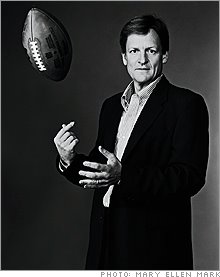
In case you are wondering why I keep harping about the book, here's yet another example of thinking that stems from the book that I like.
The movie rights for "The Blind Side" were just optioned by Fox. What do you think makes for a great movie adaptation?More in this interview.
I have no idea. All of my books have been optioned, and none of the movies have been made. It's a process that's mystifying to me. A producer buys the book and then hires someone who knows nothing about the material to write the screenplay as if it's an independent expertise that has nothing to do with the subject. And then for $1 million they write a bad screenplay, and the studio loses interest.
Sounds like an inefficient market that's waiting for its Billy Beane.
It is an inefficient market waiting for its Billy Beane. "Moneyball" resonated in the most extraordinary ways in Hollywood. Billy and I did two separate corporate performances, one for Sony's (Charts) movie division and another for News Corp.'s (Charts) Fox.
Other movie people got in touch with Billy. They're trying to figure out things like, How do we measure the contribution of Tom Cruise to a movie? Why do we automatically pay him $25 million? It's an industry trapped in convention, just like baseball.
I've often wondered how Hollywood got so steeped in its current methods of production.
Just thinking this morning, I was struck by how many institutionalised notions fly around in the film business. Executives, Agents, riders, trailers, entourages... the list of things that are not to do with the direct production and marketing of films is quite enormous.
Imagine you are a studio exec. If you had any rationality, you are forced to look at the cost of the entire below-the-line costing of a film and then look at the above-the-line cost of a star like Tom Cruise and have to wonder if that guy is shouldering the same risks as the people who develop and produce the project. Especially because the industry as a whole underperforms bank interests - ie. if you were an investor, you're better off keeping your money in a fixed-term deposit account. It's a crappy business in terms of returns. You'd have to be thinking about this problem.
What's worse, this thinking of, 'pay the star big' has started to spread to other movie markets around the world, and the crazy fact of the matter is, stars are not born; they're all manufactured. Studios have always had the capacity to make another star. It's not that hard given their resrouces, and yet they somehow seem to forget their strengths.
For every Tom Cruise, there are a number of leading men who will be capable of playing the same role for much less money. Surely the money saved on not hiring Tom Cruise is money well saved if the property is good. In turn, if I were an investor and found out that in a $125million movie with a cast & crew numbering 300, that 20% of my money went to one man would make me very suspicious of that man's added value to the project.
The argument the particluar man makes is that his presence makes the film possible. For independent producers, this is often true - but for studios, this is clearly stupid. The illusion in the film industry is that it has bought itself into a position where they think the essential this-ness of any star is the essential quality that sells a film. History shows this is not true.

No comments:
Post a Comment